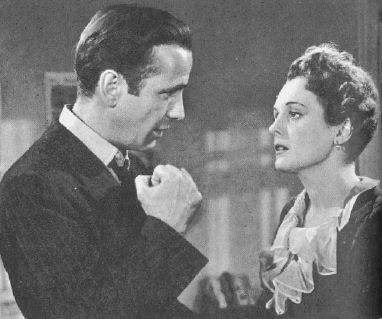
In a recent post on her website, my wonderful daughter-in-law reflects on whether she and Darien will have children. The reflection was occasioned by our Iowa Thanksgiving where she saw all of her husband’s cousins having children (and I mean all, the only exceptions being those who are in college or younger). So Betsy compiles a list of pros and cons.
Or rather cons since there is only one pro. “Ultimately,” she concludes, “the only really good reason I can think of is that it might be a very cool adventure to experience with my husband, the two of us.”
Betsy’s exploration reminds me of the passage from Dashiell Hammett’s Maltese Falcon where Sam Spade is debating whether to turn Bridget O’Shaunessy over to the cops and the electric chair for killing his partner. He too comes up with a long list of reasons for doing so and only one for not. But that one is compelling. I quote from the movie:
Spade: When a man’s partner’s killed, he’s supposed to do something about it. It doesn’t make any difference what you thought of him, he was your partner, and you’re supposed to do something about it. And it happens we’re in the detective business. Well, when one of your organization gets killed, it’s – it’s bad business to let the killer get away with it. Bad all around. Bad for every detective everywhere.
Brigid: You don’t expect me to think that these things you’re saying are sufficient reasons for sending me to the—.
Spade (interrupting): Wait’ll I’m through. Then you can talk. I’ve no earthly reason to think I can trust you, and, if I do this and get away with it, you’ll have something on me that you can use whenever you want to. Since I’ve got something on you, I couldn’t be sure that you wouldn’t put a hole in me some day. All those are on one side. Maybe some of them are unimportant – I won’t argue about that – but look at the number of them. And what have we got on the other side? All we’ve got is that maybe you love me and maybe I love you.
Of course Betsy is talking about having children, not covering for a killer. Also, Spade is weighing whether to follow reason or emotion (chillingly he opts for reason) whereas Betsy questions a number of the pragmatic reasons given for children. In doing so, I think she’s absolutely right. Pragmatism doesn’t begin to do justice to the experience of having children, which is so beyond reason that, after they arrive, any careful calculations come to be seem laughably irrelevant.
For me, the “cool adventure” argument transcends all others. Children are unpredictable and no rational scenario can imagine the directions they will take your life. You discover new things about yourself, some good, some not so good. You pour your heart into children and sometimes they die (as occurred with my oldest). However much control you previously thought you had, with children you find yourself caught up in an ancient narrative, thousands of years old, that bends you to its will. You participate in life in an entirely new way.
In short, having children is a leap of faith into an uncertain future where there are no guarantees. If one has a choice, maybe cool adventure is reason enough.
To be sure, as a potential grandfather I’m not a neutral party. I want Betsy and Darien to have children some day (item #3 on Betsy’s list involves parental desires). But if they don’t, I can’t complain. My cup already runneth over from having had Darien and his younger brother and now being joined by Betsy.
So it is not up to me to persuade Betsy and Darien one way or the other. In any event, such talk can only go so far because we are coming at the question from two entirely different worlds. It’s like the conversation in Jane Austen’s Persuasion where Admiral Croft and Mrs. Croft are debating with Captain Wentworth about whether women should be allowed on board ship to be transported to their husbands.
Mrs. Croft has made a strong argument in favor, saying that women are tougher than he thinks and that “we none of us expect to be in smooth water all our days.” The admiral assures his wife that the captain will think differently once he himself is married. Wentworth replies by essentially saying that there’s no possibility of agreement when one party is coming to the question from experience and the other not:
“Ah my dear,” said the admiral, “when he had got a wife, he will sing a different tune. When he is married, if we have the good luck to live to another war, we shall see him do as you and I, and a great many others, have done. We shall have him very thankful to anybody that will bring him his wife.”
“Ay, that we shall.”
“Now I have done,” cried Captain Wentworth. “When once married people begin to attack me with,–`Oh! you will think very differently, when you are married.’ I can only say, `No, I shall not;’ and then they say again, `Yes, you will,’ and there is an end of it.”
To put Betsy’s wrestling in perspective, she and Darien are both under 30 and have time. Given that they have just started a marketing business in Manhattan (Discovering Oz is barely over a year old) and that she has just started a singing career, I can see that this isn’t the best time to have a baby. I’m not so in favor of grand adventures that I throw out logical reasoning altogether.

